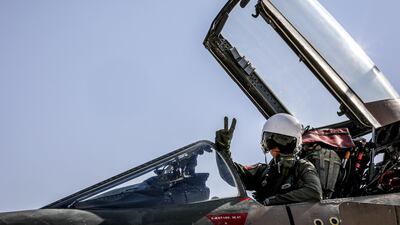Reports indicate that on August 7, Al Qaeda's second-in-command, Abdullah Ahmed Abdullah, known to the world as Abu Muhammed Al Masri, was gunned down in the streets of northern Tehran by two assassins.
If true, Al Masri’s killing would represent a significant boost in the fight against global terrorism. But what of the fact that his alleged death occurred in Tehran?
Iranian officials have strenuously denied that Al Masri was killed, and that he was even in Iran at all. Its regime promotes an image of itself, at home and abroad, as a zealous defender of all Shiite Muslims, unwaveringly committed to revolutionary ideology.
Countless Muslims have been included in the long list of victims of Al Qaeda attacks. The presence of a senior Al Qaeda operative on Iranian soil would, therefore, present awkward questions for the country’s regime.
The reality, however, is that Iran’s government has a longstanding policy of providing safe harbour to foreign terrorist groups – even those it claims to be ideologically opposed to.
Tehran’s relationship with Al Qaeda is complicated and ambivalent, beginning after the terrorist group’s September 11, 2001 attacks on the US. At the time, Al Qaeda was operating out of Afghanistan under the protection of the Taliban. In the intervening years, various Al Qaeda operatives were apprehended by Iran’s authorities along the Afghan border. Instead of being made to face justice or be turned over to the security forces of the new Afghan government, they were kept by Tehran as tools for Iran to use in its regional campaigns against the US.
Al Qaeda-affiliated groups have made use of the developing ties. Pakistan-based terrorist cells have employed “fixers” in the Iranian border city of Zahedan, which is heavily patrolled by Iranian security services. Somalia-based Al Shabab, an Al Qaeda ally, has utilised Iranian ports to export charcoal, defying a UN ban.
After Al Qaeda’s leader Osama Bin Laden was killed in Pakistan by US forces in 2011, photos taken from his compound showed his son-in-law and Al Qaeda operative Sulaiman Abu Ghaith on family outings in northern Tehran, where he was meant to be in police custody. He occasionally released Al Qaeda propaganda videos while inside Iran. Tehran had released Abu Ghaith by 2010, and he evaded justice until his arrest by Jordanian police in 2013.
In this context, Al Masri’s alleged presence in Tehran this year is less surprising.
Today, as Al Qaeda’s reach is no longer quite as strong as it was two decades ago, the regime in Tehran seeks legitimacy at home by claiming to be the protector of Muslims against extremist groups such as ISIS. It has lionised Qassem Suleimani, the former leader of the Islamic Revolutionary Guard Corps who was killed by a US drone strike last January, as the symbol of that supposed effort.
But ISIS has its roots in Al Qaeda, and both groups continue to plan attacks against Iran’s neighbouring states – namely, Iraq, Afghanistan and Pakistan- and beyond. Tehran must be held to account for its cynicism and its desire to perpetuate a cycle of violence by assisting terrorists and then claiming to protect their victims.
Iran’s relationship with Al Qaeda is often described as an alliance of convenience. But what is convenient for Iran and Al Qaeda in the short term is deadly for so many innocents in the Middle East.



